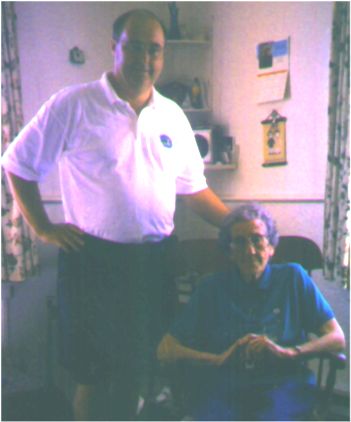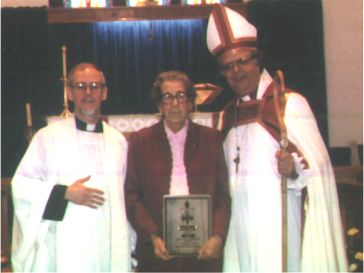
By Neil Earle

There's no discouragement,
Shall make him once relent,
His first avowed intent
To be a pilgrim.
– Anglican Hymn Book
In 1982, Helen Winnifred Earle – teacher, clerk, musician, amateur dramatist, staunch Anglican and all-round unforgettable character – was nominated as Carbonear's Citizen of the Year.
She didn't win the award. She didn't need to. Everyone who knew her as the droll, energetic, warm-hearted hard worker she was understood why. To be nominated at age 80 said it all. By the time of her death just recently, Helen Earle was one of those rare ones – community treasure, a combination, in her pastor's words, of the best traits of the biblical Martha and Mary, a distinct and robust personality from an era when women were usually expected to play second fiddle, a gift to us from another time, a time of faith.

Helen Earle was my aunt. I am hardly an unbiased recorder. Yet few will dispute the claim that she was one of the most warm and remarkable personalities my home town has produced. Her peaceful death on August 28 after a challenging struggle with Alzheimer's and other afflictions produced a remarkable outpouring, even from those who knew her only indirectly.
Helen's rich and varied life could almost be a template for much of life in Newfoundland and Labrador across the 20th Century, for she was an old-style Newfoundlander down to her fingertips. Born in 1912, "the year the Titanic went down," she used to quip, she was the third daughter of Thomas Earle, a fisherman who plied the Labrador fishery and the seal hunt to keep his family fed. Helen, like many women in that more rugged era, worked alongside the men in the historic salted cod fishery, splitting fish, cleaning up the stage head, and able to row a boat as good as any man and a lot better than some.
That was Helen – doing what it took to get the job done! One summer she salted more than 300 quintals of fish in Spear Harbour, Labrador, by herself. On a voyage home from the Labrador in the 1920s, the ship her family was on – the Earl of Devon – struck a rock off Assize's Harbour Run. Down in the blubber boat she went to take her place after being entrusted by her father with the care of her 4-year-old baby brother, George. Helen stayed calm while chaos briefly reigned and everyone got ashore. I'm glad she did! That baby brother was my father, George, eventual mayor of my home town (1969-73).
That was also Helen. "I was shipwrecked, I have constantly been on the move, I have laboured and toiled and have often gone without sleep; I have known hunger and thirst and have often gone without food" (2 Corinthians 11:25-27). Dr. David Pitt of Memorial University described her generation well – "of the earth, earthy; of the sea, salty"! She would have identified with the recent movie, "The Perfect Storm."
The late 1930s found Helen teaching school in a tiny place called Spout Cove for a salary of $12 a month ($6 of which went to pay board). She would tell her niece, Lydia Ash, how she often walked home on the weekends for 12 miles during severe snow storms of that era, following the telephone lines for guidance over the bitter barrens.
The decades from the 1940s to the 1960s saw Helen teaching at St. Andrew's School, a building converted from an old Presbyterian Church and moved to where a grocery store now stands. There she hit her full stride. Even with four grades in that proverbial one-room schoolhouse, Helen's rough and ready spirit was up to the task though, her pupils all knew, her heart was as soft as eiderdown.
At St. Andrew's and later at Murray Elementary, Helen did her best work. There she helped shape the minds and spirits of young boys and girls who have gone on to solid achievement in life – Mayor Claude Garland, local entrepreneur Harold Laing, former town Postmaster, George Murray.
The 1960s found her ending her teaching career at the old St. James High School where I was briefly her nephew-colleague in the summer of 1965. Her witty remarks and comical comments put our classroom trials in perspective. She ended her busy working life as a clerk for Earle Freighting Service, a fish-exporting business run by her cousins.
Through it all, Helen Earle tackled life with a zest and a gusto that marked her as exceptional. She was a refreshing original, a counterpoint to today's era of pre-packaged entertainment and cyberspace. Dr. Phil Earle described her as "someone who would literally do almost anything for you, anything, and hospitable to a fault." To sailing captain Roland Howell, Helen "never looked down, she was always involved, always working with something in her hands, and yet she accepted things the way they were."
Citizen of the Year? That's nothing. Helen could build a school concert around her mouth organ or inspire a lagging young communicant with her exemplary record of church attendance at her beloved St. James Anglican – and in all kinds of weather. Once when she missed a service, half the congregation rang her phone off the wall that afternoon to see if she was okay. She loved it!

Perhaps the most meaningful to Helen of her many public tributes came in 1994. That year the Anglican Bishop of Eastern Newfoundland unexpectedly presented her with an award for her lifetime of church service, including a record 60-plus years as a choir member! It was well-deserved for, in her later years, I often thought that my unpretentious and down-to-earth aunt Helen was turning into a kind of modern-day saint, a living exemplar of the warm human values in a time of moral flux, a denominational loyalist who yet accepted all people at face value. Anglicans who worry about the future of their fellowship can take heart when they ponder her rich legacy.
My own quite natural tribute to her came also in 1994 when I was asked to contribute an article for an international magazine on the subject "Sharing Your Faith." Helen came immediately to mind. An incident from my own childhood triggered off a reflection on how she had taught me to pray quietly to a loving and forgiving God. "If you say you're sorry, and you really mean it, God will forgive you!" – there's a whole world of theology in that one sentence. I hope I'll never forget the experience.
What a life! What a person! Those of us who knew her up close have no problem seeing her as one of the "greats" of what NBC-TV's Tom Brokaw has called "the Greatest Generation." She was a rare mixture of unvarnished integrity and brotherly love mixed with an unquenchable love for life. She possessed more than her fair share of that steely determination fisher folk have of staring down the worst that life can do to you with rare humor and good cheer. Gloucestermen know what I'm talking about!
Many of us will never hear a lively mouth organ tune or hear an Irish jig without stopping and smiling at her memory. Go ahead, smile on. That's what she would have wanted. "For the good are always the merry/Save by an evil chance/And the merry love to fiddle/ And the merry love to dance."